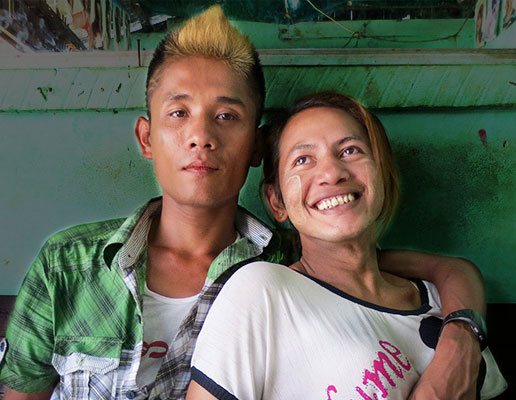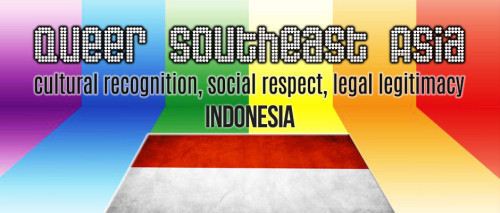How LGBT Burmese see themselves; plus Singapore, Indonesia
Colin Stewart is a 45-year journalism veteran living in Southern…
Discussions of anti-LGBTI attitudes and laws in Singapore, Indonesia and Myanmar (Burma) are a focus of the latest edition of the online Kyoto Review of Southeast Asia, which has as its theme “Queer in Southeast Asia.”
The review also presents similar articles about Philippines, Vietnam and Thailand, which are not included in the world’s 76+ countries with laws against same-sex intimacy.
These are the online publication’s summaries of the articles about Singapore, Indonesia and Myanmar:
-

LGBTI couple in Myanmar (Photo courtesy of Kyoto Review) “Familial Transphobia and Kinship of Opens in Myanmar.” David Gilbert contends that for transgenders in Myanmar legal issues are of relatively minor concern compared to the intensity of opposition and social exclusion they face from their own families. Gilbert argues that many, perhaps the majority, of transgenders in Myanmar are only able to live openly by leaving their birth families and establishing alternative forms of kinship relations with other similarly excluded transgenders. Gilbert sees the opening of the Burmese economy as providing transgenders with opportunities to build independent careers, or lines of work, in the beauty industry and other fields such as spirit mediumship. Gilbert provides this description of how Burmese LGBTI people understand and identify themselves:
“ ‘In Myanmar a range of vernacular Burmese terms and borrowed English expressions are used to denote gender and sexual minority subject positions. The main male subject positions are apwint (‘open’), apôn (‘hider’), homo and thu nge (‘guy’). ‘Opens’ are males who act and appear feminine. For ‘opens,’ taking female hormones, imported from China, is a common although not universal rite of passage as they move from their gender normative family to become members of the male-to-female trans community. Gender reassignment surgery is not yet available in the Myanmar’s medical market, although a very small number of ‘opens’ with access to funds have been able to access such surgery overseas.
“ ‘Hiders’ and ‘homos’ are males who pass as normatively masculine. ‘Guys,’ sometimes called ‘straight’ by Burmese speakers of English, are also gender conforming and are the primary of object of sexual interest amongst ‘opens’ and, to a lesser extent, ‘hiders.’ While ‘hiders’ are linguistically positioned as ‘hiding’ their inner feminine self, those who are labelled as ‘homo’ in many ways reject the local cultures of gender and sexuality in which a ‘feminine’ male is expected to seek out relations with a normatively masculine ‘guy.’ ‘Homos’ can be either feminine or masculine identified, and attracted variously to other ‘homos’ or ‘guys.’ “
-

Gary Lim and Kenneth Chee, who unsuccessfully challenged Singapore’s anti-gay law. “Activism to Decriminalise Homosexuality in Singapore.” Lynette Chua describes the paradox of the Singapore government’s preparedness to now recognise the contributions of gay men and lesbians to the country yet its intransigent refusal to abolish an anti-sodomy law inherited from the former colonial power of Great Britain, despite and in the face of a stridently anti-colonial nationalism in other dimensions of official discourse. The article concludes that the failure of recent court cases challenging Singapore’s anti-sodomy law leaves action by the Singapore parliament as the only recourse:
“[The cases] represent the end of queer activism through the courts for the foreseeable future. Anybody bringing a similar case would have to contend with these judgments, which are binding upon lower courts on the same points of law. In short, the judgments indicated that any changes to Section 377A will have to be made by the legislature, the majoritarian institution.
“Unfortunately, it is uncertain whether Singapore’s parliament would be willing to do so, especially since the 2007 statements about the law’s symbolisation of “majority values”. This state of affairs was exactly why queer activists turned to the courts, which do have constitutional power to rule for the protection of minority rights. Yet, the courts pointed the activists back to the legislature.
“Dominated by a single party, the legislature could easily repeal Section 377A.
“However, in the face of fierce opposition from the religious right and the entrenched perceptions of their constituents, Singapore’s parliament will require not only moral conviction but also strong political motivation to stand up for the country’s queer populace.”
 “Living in a State of Suspension: Emotional Dimensions of Normative Violence Towards Indonesian Queers in Islamic Legal Discourse. Ferdiansyah Thajib traces the disturbing rise of anti-queer rhetoric among a range of orthodox Islamic figures and organisations in Indonesia, in part fuelled by a perception of queer rights as a marker of Western cultural influences. He details the ways these discourses are impacting detrimentally on the legal status, personal security and quality of life of queer men and women in the country. Thajib states:
“Living in a State of Suspension: Emotional Dimensions of Normative Violence Towards Indonesian Queers in Islamic Legal Discourse. Ferdiansyah Thajib traces the disturbing rise of anti-queer rhetoric among a range of orthodox Islamic figures and organisations in Indonesia, in part fuelled by a perception of queer rights as a marker of Western cultural influences. He details the ways these discourses are impacting detrimentally on the legal status, personal security and quality of life of queer men and women in the country. Thajib states:
“The various emotional rhetorics backed by religious orthodoxy range from calls for harsher punishment that emphasise the role of the family in “curing” sexual “deviants” to statements that the perpetrators of these “vile acts” deserve to die. …
“While the ostensibly secular national government has shown a lukewarm response towards the anti-homosexual content in recent Islamic legal discourse with a wait-and-see policy, both nominally religious and devout Muslims queers remain in an awkward state of prolonged suspension.
“Human rights advocates and local LGBTIQ activists have repeatedly warned of the possibility for these hostile Islamic legal pronouncements to expand their impact more broadly. In the context of the bylaw in Aceh, activists fear that other conservative provinces will follow suit if the national government does not step in and overturn the law.”
Overall, the publication states, Queer Southeast Asia “is united by similar experiences of exclusion, marginalisation and even criminalisation as well as by a joint aspiration to resist and confront the many forms of stigmatisation and discrimination imposed upon them by dominant moral cultures and legal regimes.”
Related articles
- Singapore court rejects appeal of anti-gay law (October 2014, 76crimes.com)
- Indonesian activists reject Muslim clerics’ anti-gay fatwa (March 2015, 76crimes.com)
- Archive of this blog’s coverage of Singapore
- Archive of this blog’s coverage of Myanmar
- Archive of this blog’s coverage of Indonesia







Reblogged this on Fairy JerBear's Queer World News, Views & More From The City Different – Santa Fe, NM and commented:
LGBTQIA news from Southeast Asia, a part of the world I care about after living in Thailand and Indonesia.